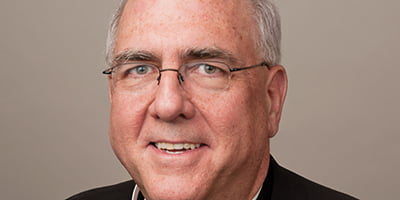by Archbishop Joseph F. Naumann
On Feb. 10, I joined with a coalition of other religious leaders in Topeka for a press conference to encourage the members of the Kansas Legislature to repeal the death penalty. The following is the text of my statement:
“I come today to join with many other voices from Kansas to advocate for the elimination of the death penalty. In doing so, I wish to acknowledge the complexity of this issue.
In speaking in favor of the abolition of the death penalty, it is not my intention to minimize the pain and loss of individuals and families who have suffered the death of a loved one as a result of a violent crime. My own father was murdered. At the time, my brother was not yet 2 and my mother was pregnant with me.
The suffering and the circumstances of each family that has lost a loved one by a violent crime are unique. I do not presume to be able to speak for all victims of murder. Yet, I did witness how my mother struggled to provide for our family without the benefit of my father and the pain that she suffered as a result of losing the love of her life. I also know what it is like for children to grow up without a father.
Society in general, and the church in particular, have a responsibility to surround with compassion and support the families of murder victims. I am eager to support ways in which the state of Kansas can be more responsive in assisting families that have lost a loved one. I also welcome suggestions for additional ways in which the Catholic Church can assist the victims of violent crimes.
Murder is an unspeakable evil. Those who perpetrate such a crime have inflicted a grave injustice not only upon the person who was murdered, but also upon all their loved ones. In reality, there is nothing that society can do to the perpetrator that will restore life to the victim or heal the wounds of grieving family members.
The state has an obligation to do what it can to prevent the occurrence of murders and to protect its citizens from being victimized by violence. The criminal justice system has a responsibility to protect the innocent from victimization and to deter the commission of violent crimes.
While our church acknowledges that there can be circumstances in order to protect society where the death penalty can be justified, those conditions do not exist in the United States today. We have the ability to protect society from violent criminals without resorting to the death penalty.
There are many problems with the implementation of the death penalty. Most troubling is the prospect of executing an innocent person. Since 1973, 143 individuals have been released from death row as the result of evidence that demonstrated they were wrongly convicted.
The appeal system attempts to prevent such mistakes, but it creates its own set of problems. The numerous appeals of those convicted can be a source of re-victimization of families who have lost a loved one. Each appeal can be the occasion for these families to experience again the horror of their loved one’s death.
The appeal process is very expensive, making it more costly for the state to execute criminals than to incarcerate them for life. These resources would be better used to assist the families of victims.
Moreover, there is economic injustice in the application of the death penalty. Those with the financial means to employ the most skilled attorneys in their defense are much less likely to be executed than the poor.
In our Catholic tradition, we venerate certain individuals for their example of heroic virtue as saints. Among the saints of the 20th century was an Italian teenager by the name of Maria Goretti.
In 1902, Maria Goretti was assaulted by a man named Alessandro Serenelli who attempted to rape her. When Maria declared that she would rather die than submit, Alessandro stabbed her several times.
As Maria Goretti lay dying, she forgave Alessandro. Alessandro was imprisoned for 27 years. During that time, he underwent a conversion, deeply regretting the grave evil that he had done to Maria and her family. Upon his release from prison, Alessandro went directly to Maria’s mother to ask her forgiveness.
Inspired by Maria’s expressions of mercy at the time of her death, her mother also forgave Alessandro. At the canonization ceremony in St. Peter’s Square, Alessandro was among the crowd of 250,000 who came to celebrate the beauty of Maria Goretti’s short earthly life.
Capital punishment is the wrong response to heinous crimes. With other means available to protect society, it is unnecessary and wrong to respond to violent crimes with state-sanctioned violence. When we choose to kill in the name of justice, our society lowers itself to imitate the violence of the perpetrator.
Our criminal justice system should strive for rehabilitation and the transformation of criminals, not their execution. Society’s decision not to employ the death penalty is not because we do not appreciate the horror of the crime committed, but because we choose not to respond to senseless violence with an act of unnecessary violence. If anything can bring healing to the hearts of those mourning the death of a victim of a violent crime, it is not the destruction of another human life, but the possibility of saving a soul.
Therefore, on behalf of my brother Catholic bishops of Kansas, I urge the members of the Kansas General Assembly to repeal the death penalty and to repeal it now.”
It occurred to me at the press conference that I did not even know the name of the man who murdered my father. I am so grateful that my mother did not focus our family’s attention on the person who took my father’s life, but rather on how we should live to keep and honor his memory.



